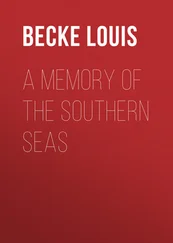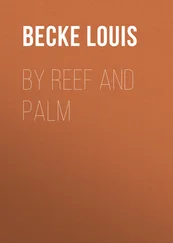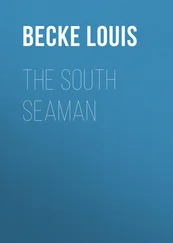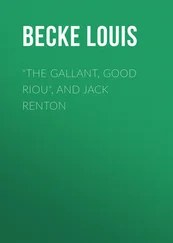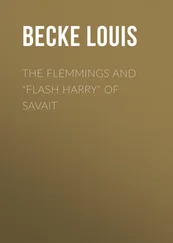Louis Becke - Tom Gerrard
Здесь есть возможность читать онлайн «Louis Becke - Tom Gerrard» — ознакомительный отрывок электронной книги совершенно бесплатно, а после прочтения отрывка купить полную версию. В некоторых случаях можно слушать аудио, скачать через торрент в формате fb2 и присутствует краткое содержание. Жанр: foreign_prose, literature_19, foreign_antique, на английском языке. Описание произведения, (предисловие) а так же отзывы посетителей доступны на портале библиотеки ЛибКат.
- Название:Tom Gerrard
- Автор:
- Жанр:
- Год:неизвестен
- ISBN:нет данных
- Рейтинг книги:4 / 5. Голосов: 1
-
Избранное:Добавить в избранное
- Отзывы:
-
Ваша оценка:
- 80
- 1
- 2
- 3
- 4
- 5
Tom Gerrard: краткое содержание, описание и аннотация
Предлагаем к чтению аннотацию, описание, краткое содержание или предисловие (зависит от того, что написал сам автор книги «Tom Gerrard»). Если вы не нашли необходимую информацию о книге — напишите в комментариях, мы постараемся отыскать её.
Tom Gerrard — читать онлайн ознакомительный отрывок
Ниже представлен текст книги, разбитый по страницам. Система сохранения места последней прочитанной страницы, позволяет с удобством читать онлайн бесплатно книгу «Tom Gerrard», без необходимости каждый раз заново искать на чём Вы остановились. Поставьте закладку, и сможете в любой момент перейти на страницу, на которой закончили чтение.
Интервал:
Закладка:
These journalistic amenities were accorded serious attention by the society of Bowen, which, by reason of the many Government officials established there, considered itself very exclusive. The majority of these officials were connected with the law, for Bowen was the proud possessor of not only a resident judge, but also a new courthouse of such ample dimensions that the whole population of the town could have been accommodated therein. How the numerous barristers, solicitors, and the smaller legal fry lived was a mystery. Perhaps, like the mythical French town whose population supported themselves by doing each other’s washing, the legal gentry of Bowen existed by performing each other’s clerical work. Next in numbers—though not in social standing—were the Government officials connected with the Harbour and Lights Department, and “The Jetty.” The Jetty was one of Bowen’s triumphs; was over a quarter of a mile long, cost twenty thousand pounds to build, and was costing four thousand pounds a year to keep in order, and enable the staff of engineers, inspectors, etc., to dress in a gentlemanly style, and maintain their prestige as officials of higher importance than the Customs officers, of whom Bowen was provided with six, all dressed very becomingly, and all more or less related to members of the Queensland Cabinet—as a matter of fact it would have been a difficult task to find any male person in the Government service in Bowen—from His Honour Judge Coker to Paddy Shea, the letter-carrier, who was not connected with, or did not owe his position to a member of the Ministry. And Bowen revelled in the knowledge that Brisbane and the Legislature dared not refuse Bowen any reasonable request, for already there was a dark rumour concerning Separation—the division of the colony into North and South—and the Clarion had warned the “inert and muddling Government” of the colony “that unless the just and courteous request of the telegraphic staff of the Bowen Repeating Office for a punkah is acceded to without further circumlocution, the growing movement in favour of Separation will be openly advocated by this journal. Already (of this we have private knowledge) has Lord Kimberley expressed himself astonished at the heartless refusal of our benighted Colonial Secretary and Treasurer to grant the insignificant sum of two hundred pounds to the necessitous widow of Samuel Wilson, who was killed by being run over by a trolley on our beautiful jetty. Does the Colonial Secretary know the meaning of the word Nemesis? Let him ponder!”
The appearance of Bowen at this time of latent agitation for Separation and open and undisguised animosity to the “upstart collection of humpies on a mud bank in Cleveland Bay,” was pleasing in the extreme. Wide, tree-planted, grassy streets, kept scrupulously clean, handsomely-built bungalows, enclosed in gardens containing tropical and sub-tropical plants (the residences of the officials and their families), a court-house and other public buildings of such size and ornate construction that they surpassed those of any other town in the colony, except the capital; an environment of back country grateful to look upon, and a harbour of surpassing beauty.
The editor of the Clarion despite his inflated leaders, was a thoroughly sensible man, who fully recognised the potentialities of the port, and yet saw that it was doomed to sink into comparative insignificance, and that the “collection of humpies on a mud bank” was to be the future capital of the Far North. But he struggled on gamely. He was a genial, merry-hearted old bachelor, who had once loved his paper as a mother loves her one child, and had spent his capital of two thousand pounds in trying to keep the town alive as long as possible. A refined, highly-educated man, he was obliged—after two years’ bitter financial experience—to resort to the type of journalism prevalent amongst Australian country newspapers; otherwise he could not have made a living. But he despised the very people for whom he was apparently fighting so strenuously, and often savagely reproached himself for having turned aside from the straight path.
“Thank Heaven, I’m not married!” he said to himself one evening, as throwing himself down upon a couch in his bedroom at the Queen’s Hotel, he began to glance through a bundle of exchanges which he had brought from the office, and in a few minutes a smile spread over his face, as he read the following in the Rockhampton Bulletin :
“The Bowen Clarion is making a game effort to bolster up that little tin-pot township with its coterie of highly-paid, useless officials, who for six years past have battened on the public revenues. It was the misfortune of a representative of this journal to be obliged to spend two weeks in Port Denison not long since, and his terse description of the spot and its inhabitants deserves a place in the guide book of the colony which has yet to be written. Bowen is a delightfully laid-out town on the shores of Port Denison. It is inhabited by some six hundred people—mostly official loafers and spongers of the worst type. The community consists of boozy squatters, snobbish wives of snobbish officials, anaemic old maids, obsequious tradesmen on the verge of insolvency, and two respectable and hard-working persons—the latter are Chinamen. The ‘tony’ society of Bowen is about as lively and intelligent as that of a decaying Cathedral town in the old country. The atmosphere of matchless snobbery and vulgarity that pervades Bowen can be perceived by the passing voyager many miles out at sea.”
“By Jove! he’s not far wrong,” commented the editor, as putting down the paper he took up another, and had just ripped off the the cover, when the chambermaid tapped at the door, then entered with a card.
“The gentleman wishes to see you particularly, sir.”
He took the card from the tray, and read,
THOMAS GERRARD. Ocho Rios.
beneath was written, “Urgently desires to see the editor of the Clarion on business of importance.”
“Ask him to come in, Milly,” he said as he kicked a chair into position.
CHAPTER VII
“How do you do, Mr Gerrard?” he said, as with outstretched hand he met his visitor at the door. “I am glad to meet Ted Westonley’s brother-in-law at last. How is he?”
“Very well, indeed, when I last saw him,” replied Gerrard, as he sat down, and Lacey rang the bell.
“I have not seen him for ten years,” said the editor. “Ah, here you are, M illy! What will you take, Mr Gerrard? You must excuse my rig” (he was in his pyjamas); “but it’s so infernally hot that I always get into these the minute I’m back in my room. When did you arrive?”
“Only an hour ago, in the Tinonee .”
“Going back to your station, I suppose? By the way, aren’t you—or is it Jardine?—who is the ‘furthest north’ cattle man?”
“Jardine; but his station is on the east side. I’m on the west; the Gulf side, between the Batavia River and Duyfhen Point.”
Lacey looked admiringly at the well-knit figure and handsome, tanned face of his visitor. “Well, the climate up there can’t be as bad as it is painted. I never saw a man look better than you do.”
“Oh! the climate doesn’t hurt me now. I’ve had my share of fever of course; so has everyone on Ocho Rios. The niggers are our chief trouble.”
“Ah! no doubt. By the way, Aulain, of the Black Police is down here on sick leave. He’ll be glad to see you.”
“And I him. He’s a fine fellow, isn’t he?”
“A whiter man—or a better gentleman—never put foot in a stirrup. I’ve got to like him very much. And he thinks no end of you. Says you’re the best scrub rider he ever saw.”
Gerrard laughed. “‘Praise from him is praise indeed.’ All I can say is that I have never seen anyone who can go through scrub or thick timber like Randolph Aulain. Where is he staying?”
Читать дальшеИнтервал:
Закладка:
Похожие книги на «Tom Gerrard»
Представляем Вашему вниманию похожие книги на «Tom Gerrard» списком для выбора. Мы отобрали схожую по названию и смыслу литературу в надежде предоставить читателям больше вариантов отыскать новые, интересные, ещё непрочитанные произведения.
Обсуждение, отзывы о книге «Tom Gerrard» и просто собственные мнения читателей. Оставьте ваши комментарии, напишите, что Вы думаете о произведении, его смысле или главных героях. Укажите что конкретно понравилось, а что нет, и почему Вы так считаете.

